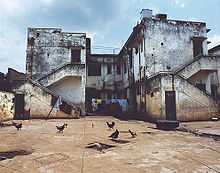Zarina Bhimji

Zarina Bhimji (born in Mbarara, Uganda, 1963) is a Ugandan Asian photographer and film maker, who was nominated for the Turner Prize in 2007.[1]
She lives and works in London.
Life and work
Zarina Bhimji was educated at Leicester Polytechnic (1982 – 1983), Goldsmiths' College (1983 – 1986) and Slade School of Fine Art, University College London (1987 – 1989).[2]
In 2001 Bhimji won the EAST award at EASTinternational selected by Mary Kelly and Peter Wollen.
The artist participated in Documenta 11 (June - September 2002) with her 16mm film "Out of Blue".
2003–2007, she travelled widely in India, East Africa and Zanzibar, studying legal documents and the stories of those who formed British power in those countries, carrying out interviews and taking photographs.[3]
In 2003 Zarina Bhimji received the ICP's (International Center for Photography, New York City) Infinity Award in the Art Photography category. Other recipients for this award category have included David Hockney (1985), Chuck Close (1990), Cindy Sherman (1994), Sigmar Polke (1998), Andreas Gursky 2001), Shirin Neshat (2002) and Thomas Ruff (2006).

In 2007, she was shortlisted for the Turner Prize for photographs of Uganda. Their theme is the expulsion of Asians from the country by Idi Amin and the subsequent loss and grief caused.[1] The photos were in exhibitions at Haunch of Venison gallery in London and Zurich.[3] Her Turner Prize display includes a film, Waiting, which was shot in a sisal-processing factory. This is on high-definition video, transferred from the original 35mm film.[3]
The Tate gallery describes her work:
| “ | Bhimji’s photographs capture human traces in landscape and architecture. Walls are a recurring motif, attracting her through their absorption of history as they become a record of those who built, lived within and ultimately abandoned them. Despite a conspicuous absence of the body, the photographs emit a human presence. Reference to it is sometimes explicit – a row of guns awaiting use in Illegal Sleep, yet sometimes only implied – the hanging, disconnected and electrical wires in my Burnt my heart ...
Bhimji captures her sites with relentless formal concerns intended to convey qualities of universal human emotion and existence – grief, longing, love and hope. Concrete places become abstract sentiments as the physical rhythms of landscape and architecture become psychological.[3] |
” |
In 2012, the first major survey exhibition of her work was held at Whitechapel Gallery, London (19 January - 9 March 2012), which traced 25 years of Bhimji’s work. It opened with the joint premiere of her long-awaited film, Yellow Patch (2011), at The New Art Gallery Walsall[4][5] and Whitechapel Gallery, the film was inspired by trade and migration across the Indian Ocean. An accompanying monograph was published by Ridinghouse in association with Whitechapel Gallery, Kunstmuseum Bern and The New Art Gallery Walsall.[6]
See also
Notes and references
- ↑ 1.0 1.1 Reynolds, Nigel "Iraq protest camp shortlisted for Turner Prize" The Daily Telegraph online, May 10, 2007. Retrieved May 21, 2007
- ↑ "Education", zarinabhimji.com Education page. Retrieved 21 May 2007
- ↑ 3.0 3.1 3.2 3.3 "Turner Prize: The shortlisted artists", Tate online. Retrieved 29 November 2007.
- ↑ http://www.artrabbit.com/all/events/event/31042/zarina_bhimji_yellow_patch
- ↑ http://www.thenewartgallerywalsall.org.uk/whats-on/exhibition/zarina-bhimji-yellow-patch
- ↑ "Zarina Bhimji Ridinghouse publication". Ridinghouse. Retrieved 5 August 2012.
External links
|